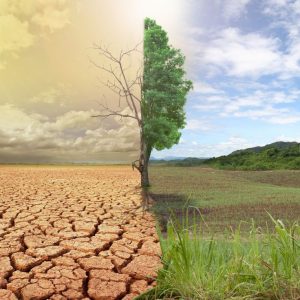As the impacts of climate change continue to intensify and global shocks upend business as usual, Sub-Saharan Africa is feeling the brunt of what has been coined “the perfect storm” – food, fuel, and fertilizer crisis exacerbated by the war in Ukraine, scarring effects from the COVID-19 pandemic, soaring inflation, rising debt, and extreme weather.
Climate events, which destroy crops and disrupt food transport, are disproportionately common in the region. One-third of the world’s droughts occur in sub-Saharan Africa, and Ethiopia and Kenya are enduring one of the worst in at least four decades. Countries such as Chad are also being severely impacted by torrential rains and floods.
The resulting rise in poverty and other human costs are compounded by cascading macroeconomic effects, including slower economic growth. Thus, this piece will look at the current risks from climate change, what has been done, and what more can be done to mitigate its impact and improve food security in Africa.
The current challenges and risk
Crop Yields: Climate change is expected to have a negative impact on crop yields in Africa. According to the Intergovernmental Panel on Climate Change (IPCC), climate change could reduce maize yields in southern Africa by up to 30% by 2050. Additionally, climate change is expected to reduce the yields of other important crops such as sorghum, millet, and cassava.
Livestock: Climate change is also having a negative impact on livestock production in Africa. Increased temperatures and reduced rainfall are leading to declining pasture productivity, which is affecting the health and productivity of livestock. This, in turn, is reducing the availability of animal-based foods such as meat, milk, and eggs.
Nutrition: Climate change is also having a negative impact on the nutritional quality of food in Africa. Rising temperatures and changing rainfall patterns can affect the nutrient content of crops, reducing the number of essential micronutrients such as iron, zinc, and vitamin A.
Food Prices: Climate change is expected to increase food prices in Africa, making it harder for low-income families to access nutritious food. According to a recent report by the World Bank, climate change is expected to increase food prices in sub-Saharan Africa by up to 12% by 2030.
Food Security: Climate change is also affecting food security in Africa by reducing the availability and access to food. According to the Food and Agriculture Organization (FAO), the number of undernourished people in sub-Saharan Africa has increased by 11 million since 2015, due in part to the effects of climate change.
Recent data on the effects of climate change on food security in Africa demonstrate the urgent need for action to mitigate and adapt to climate change. Effective climate change mitigation and adaptation strategies will be essential to ensure that Africa’s growing population has access to safe, nutritious, and affordable food.
What African governments are doing
Many African governments are taking steps to address climate change and improve agricultural productivity. Here are some examples of ongoing initiatives:
Climate-Smart Agriculture Support: Many African governments are supporting the adoption of climate-smart agricultural practices through financial and technical assistance to farmers. For example, the Ethiopian government has launched the Climate-Resilient Green Economy (CRGE) initiative, which aims to promote sustainable agriculture and increase climate resilience in the country.
National Adaptation Plans: Several African governments have developed National Adaptation Plans (NAPs) that outline their strategies for adapting to the impacts of climate change, including those on agriculture. For example, the Rwandan government has developed a NAP that includes measures to promote climate-smart agriculture, such as the use of drought-resistant crops and conservation agriculture.
Renewable Energy Support: Many African governments are promoting the use of renewable energy in agriculture to reduce greenhouse gas emissions and improve energy access for rural communities. For example, the Kenyan government has launched a program to promote the use of solar-powered irrigation pumps in agriculture, which can reduce emissions and improve access to water for irrigation.
Forest Conservation: African governments are also taking steps to protect and restore forests, which can help to mitigate the impacts of climate change and improve agricultural productivity. For example, the Nigerian government has launched the Green Bonds program, which funds forest conservation and reforestation efforts.
Climate Information Services: Governments are also working to improve climate information services, such as weather forecasting and early warning systems for extreme weather events. For example, the Ghanaian government has developed a Climate Information Services (CIS) program, which provides farmers with climate information to help them make informed decisions about planting and harvesting crops.
Private Sector Partnerships: Many African governments are partnering with the private sector to promote climate-smart agriculture and improve agricultural productivity. For example, the Ethiopian government has partnered with the World Bank and private sector companies to support the adoption of climate-smart agriculture in the country.
These are just a few examples of the many initiatives that African governments are undertaking to tackle climate change and improve agricultural productivity. While progress has been made, much more work is needed to ensure that these efforts are sustained and effective in the long term.
What more can be done?
Climate change has significant impacts on food security in Africa. To mitigate climate change and improve food security in Africa, here are some steps that can be taken:
Promote Climate-Smart Agriculture: Climate-smart agriculture practices involve reducing greenhouse gas emissions, adapting to climate change, and building resilience. Practices such as conservation agriculture, agroforestry, and integrated pest management can help reduce emissions and increase yields while reducing environmental degradation.
Increase access to renewable energy: Access to clean and renewable energy can help reduce dependence on fossil fuels and reduce greenhouse gas emissions. Increased use of renewable energy sources such as solar, wind, and hydroelectric power can help mitigate climate change while improving food security.
Promote reforestation and conservation: Reforestation and conservation can help sequester carbon, reduce greenhouse gas emissions, and improve soil health. Forests also play a crucial role in maintaining water cycles and reducing soil erosion.
Build resilience to climate change: Extreme weather events such as floods and droughts are likely to become more frequent and severe due to climate change. To build resilience to these events, African countries should develop and implement plans for disaster risk reduction, including early warning systems, flood and drought management, and insurance programs.
Promote sustainable land use: Sustainable land use practices such as agroforestry, crop rotation, and intercropping can help improve soil health, reduce erosion, and increase productivity while reducing greenhouse gas emissions.
Promote low-carbon transportation: Reducing emissions from the transportation sector is critical to mitigating climate change. Encouraging the use of low-carbon transportation such as bicycles, electric vehicles, and public transportation can help reduce greenhouse gas emissions while improving access to food.
Develop and implement climate-smart policies: African countries should develop and implement policies that promote climate-smart agriculture, renewable energy, reforestation, and sustainable land use. Such policies should also promote research and development of new technologies to increase food production while reducing greenhouse gas emissions.
Mitigating climate change in Africa is critical to improving food security. By promoting climate-smart agriculture, increasing access to renewable energy, promoting reforestation and conservation, building resilience to climate change, promoting sustainable land use, promoting low-carbon transportation, and developing and implementing climate-smart policies, African countries can work towards a more sustainable and food-secure future.
Mitigating Effects of climate change to improve food security in Africa
24/02/2023- 0



